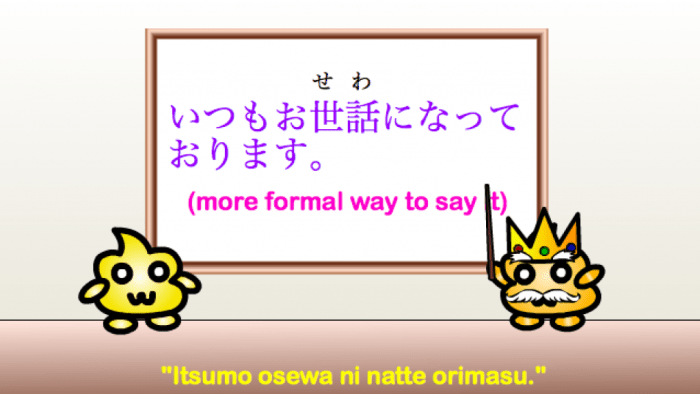Itsumo osewa ni natte orimasu, a phrase that rolls off the tongue with effortless grace, holds a profound significance in Japanese culture. Its meaning, nuances, and usage paint a vivid tapestry of respect, humility, and appreciation. Embark on a linguistic journey as we delve into the depths of this ubiquitous expression.
Beyond its literal translation, “itsumo osewa ni natte orimasu” embodies a cultural etiquette that reflects the Japanese people’s deep-seated values of gratitude and social harmony.
Etymology and Origin

The phrase “itsumo osewa ni natte orimasu” has a long history in Japanese culture. Its roots can be traced back to the Edo period (1603-1868), when the phrase was used as a polite way to express gratitude for someone’s help or kindness.
The phrase is composed of several Japanese words:
- Itsumo: “always”
- Osewa: “care, help, or kindness”
- Ni: “to”
- Natte: “become”
- Orimasu: “present tense of the verb “oru,” meaning “to be”
When combined, these words create the phrase “itsumo osewa ni natte orimasu,” which can be translated as “I am always grateful for your help and kindness.”
Cultural Significance
In Japanese culture, it is considered polite to express gratitude for even the smallest acts of kindness. The phrase “itsumo osewa ni natte orimasu” is a way to show appreciation for someone’s help or support, no matter how small.
The phrase is also used to express a sense of humility. By saying “itsumo osewa ni natte orimasu,” the speaker is acknowledging that they are not self-sufficient and that they rely on the help and support of others.
Literal Meaning and Translation
The literal translation of “itsumo osewa ni natte orimasu” is “I have always been in your care.” This phrase is used to express gratitude for someone’s kindness and support.Each word in the phrase has its own specific meaning:* “Itsumo” means “always” or “all the time.”
- “Osewa” means “care” or “support.”
- “Ni” is a particle that indicates the recipient of an action.
- “Natte” is the past tense of the verb “naru,” which means “to become.”
- “Orimasu” is the polite form of the verb “iru,” which means “to be.”
When these words are combined, the phrase “itsumo osewa ni natte orimasu” expresses the speaker’s deep appreciation for the other person’s kindness and support.
Nuances and Implications
The phrase “itsumo osewa ni natte orimasu” has several nuances and implications.* First, it is a very polite and respectful way to express gratitude. It shows that the speaker is aware of the other person’s kindness and that they are grateful for it.
- Second, the phrase implies that the speaker has been receiving the other person’s kindness for a long time. This suggests that the speaker has a close relationship with the other person and that they value their support.
- Third, the phrase can be used to express both general and specific gratitude. For example, it can be used to thank someone for a specific act of kindness, or it can be used to express general appreciation for someone’s ongoing support.
Contextual Usage
The phrase “itsumo osewa ni natte orimasu” is used to express gratitude and appreciation in a variety of formal and informal settings. It is commonly employed in situations where one person has received assistance or support from another.
Formal Settings
- Business meetings and correspondence
- Speeches and presentations
- Official ceremonies and events
Informal Settings
- Conversations with friends and family
- Emails and text messages
- Social media posts
Cultural Significance

In Japanese culture, politeness and respect are paramount, and using appropriate language is crucial. The phrase “itsumo osewa ni natte orimasu” holds significant cultural weight and is an integral part of daily interactions, reflecting the deep-rooted values of gratitude and humility.
The phrase is commonly used to express appreciation for ongoing support, assistance, or kindness received over an extended period. It conveys a sense of indebtedness and acknowledges the positive impact that others have had on one’s life or well-being.
Etiquette and Social Norms
Using “itsumo osewa ni natte orimasu” appropriately requires adherence to specific etiquette and social norms. The phrase should be spoken with sincerity and a respectful tone, often accompanied by a slight bow. The choice of words and the level of formality used may vary depending on the context and the relationship between the speaker and the recipient.
In general, it is considered appropriate to use the phrase when expressing gratitude for:
- Ongoing support or assistance from colleagues, friends, or family members
- Guidance and mentorship from superiors or teachers
li>Services provided by businesses or organizations
Tone and Formality

Itsumo osewa ni natte orimasu conveys a polite and formal tone. It is typically used in business or professional settings and is considered appropriate for expressing gratitude towards someone who has provided assistance or support.
Itsumo osewa ni natte orimasu. I hope you are having a productive day. For those interested in delving deeper into the world of literature, I recommend checking out the Fahrenheit 451 Chapter 2 Quiz . It’s a great way to test your understanding of the novel and explore its themes further.
Itsumo osewa ni natte orimasu for your continued support and engagement.
The formality of the phrase is influenced by the context and relationship between the speakers. When used in a business setting, it is considered more formal and respectful. In contrast, when used between close friends or family members, it may be used in a more casual manner.
Contextual Usage
Itsumo osewa ni natte orimasu is commonly used in the following contexts:
- Expressing gratitude for assistance or support received.
- Thanking someone for their time or effort.
- Showing appreciation for a favor or kindness.
- Acknowledging someone’s contributions or efforts.
Variations and Alternatives

The expression “itsumo osewa ni natte orimasu” has several common variations and alternatives, each with subtle differences in meaning and usage.
“Itsumo osewa ni natte imasu”
This variation is the informal version of “itsumo osewa ni natte orimasu” and is typically used in casual conversations or with people you are close to. It conveys a similar sentiment of gratitude but is less formal and respectful.
“Itsumo o sewa ni natte orimasu”
This variation is slightly more formal than “itsumo osewa ni natte orimasu” and is often used in business or professional settings. It emphasizes the ongoing nature of the support or assistance received.
“Osewa ni natte orimasu”, Itsumo osewa ni natte orimasu
This is the most concise variation and is used to express gratitude for a specific act of kindness or support. It is often used in situations where you are not familiar with the person or in brief encounters.
Cross-Cultural Comparisons
Expressing gratitude and respect varies across cultures, shaping the nuances of phrases like “itsumo osewa ni natte orimasu.” Let’s explore how it compares to similar expressions in other cultures.
In English, “Thank you” is a common phrase used to express gratitude. While it conveys appreciation, it lacks the depth and formality of “itsumo osewa ni natte orimasu.” The Japanese phrase emphasizes the ongoing nature of the relationship and the speaker’s indebtedness to the recipient.
Korean Expression
In Korean, the phrase “jeongmal gomabseubnida” is used to express gratitude. It translates to “I am truly grateful” and conveys a similar sense of indebtedness and respect as “itsumo osewa ni natte orimasu.” However, it is typically used in less formal settings.
Chinese Expression
In Chinese, the phrase “xiexie” is commonly used to express gratitude. It translates to “thank you” and is considered a neutral expression that can be used in both formal and informal settings. However, it does not carry the same level of formality or depth as “itsumo osewa ni natte orimasu.”
Modern Usage and Evolution: Itsumo Osewa Ni Natte Orimasu

The phrase “itsumo osewa ni natte orimasu” continues to be widely used in contemporary Japanese society. Its usage has remained largely constant over time, retaining its original meaning and function as an expression of gratitude and respect.
Formal and Informal Usage
In formal settings, the phrase is typically used in its full form, “itsumo osewa ni natte orimasu.” This is especially common in written communication, such as business letters or emails. In informal settings, the phrase may be shortened to “itsumo osewa ni,” or even simply “osewa ni.”
These shortened forms are more common in spoken conversation and personal correspondence.
Expert Answers
What is the literal meaning of “itsumo osewa ni natte orimasu”?
It translates to “I have always been in your care,” expressing gratitude for ongoing support and kindness.
When is it appropriate to use “itsumo osewa ni natte orimasu”?
It is commonly used in formal and informal settings to express appreciation for assistance, favors, or hospitality.
Are there any variations to “itsumo osewa ni natte orimasu”?
Yes, there are variations such as “itsumo arigatou gozaimasu” (always thank you) and “itsumo os世話になっております” (always receiving your care), each with subtle differences in formality and context.